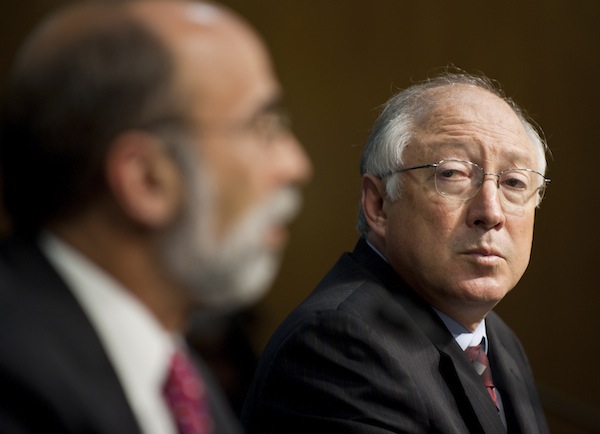Administration Lifts Deepwater Drilling Moratorium
The Obama administration announced today that it is lifting the moratorium on deepwater drilling in the Gulf of Mexico that was imposed in the aftermath of the Gulf oil spill.
Jul 31, 202041.2K Shares598.2K Views
Michael Bromwich, head of the Bureau of Ocean Energy Management, Regulation and Enforcement, and Interior Secretary Ken Salazar (Pete Marovich/ZUMApress.com)
The Obama administration announced today it is lifting the moratorium on deepwater drilling in the Gulf of Mexico that was imposed in the aftermath of the BP oil spill. But Interior Secretary Ken Salazar gave few details about how soon drilling would resume in the Gulf.
Salazar said he believes it is “appropriate” to allow drilling again in the Gulf now that the Interior Department has reviewed offshore drilling safety and issued new rules on the practice. But he noted that drilling will be allowed only for “those operators to clear the higher bar that we have set.”
[Environment1] Salazar and Michael Bromwich — head of the newly formed Bureau of Ocean Energy Management, Regulation and Enforcement — said they could not give a clear timeline for when drilling would resume, noting that oil companies must first comply with the new standards.
“I don’t think any of us siting here today knows which of the operators have begun implementing those requirements,” Bromwich said, adding that anybody who offers a time frame is “just guessing.” Salazar, pressed by reporters on the question, said, “We will soon have deepwater drilling resume in the Gulf.”
Already, though, the oil industry is raising concerns about the potential pace of drilling application approvals. The American Petroleum Institute, the powerful oil industry trade group, said it was concerned a “de facto moratorium” would remain in place because the Interior Department doesn’t have adequate resources to process applications.
API President Jack Gerard said in a statement, “Without additional resources and a serious commitment by the government to process and approve permits and other requirements expeditiously, the moratorium will give way to a de facto moratorium, which will continue to cripple the already hard-hit Gulf region and cost more than 175,000 American jobs a year.”
API spokeswoman Cathy Landry says most companies “have all the requirements in place” already and will be turning in their applications for drilling quickly. In all, 36 rigs were affected by the moratorium.
It’s not just the oil industry that’s worried about the move; Sen. Mary Landrieu (D-La.), who placed a hold on President Obama’s nominee to head the White House Office of Management and Budget, Jack Lew, until the moratorium was lifted, said in a statement that she would wait to lift the hold until she has time to review the administration’s efforts to review permits. Landrieu and other Gulf coast lawmakers have raised questions about the amount of time it will take for drilling to resume once the moratorium is lifted.
“I am not going to release my hold on Jack Lew,” Landrieu said in the statement. “Instead, I will take this time to look closely at how BOEM is handling the issuing of permits and whether or not drilling activity in both shallow and deep water is resuming. When Congress reconvenes for the lame duck session next month, I will have had several weeks to evaluate if today’s lifting of the moratorium is actually putting people back to work.”
Bromwich said BOEM has “ramped up” the allocation of resources for processing offshore drilling applications in the Gulf, adding 20 additional people for the task. He said it should only take “a day or two” to conduct the additional inspections required by the new safety rules.
Still, he admitted that submitting and processing applications will likely require time. “What’s going to slow them down to some extent is the time that applicants are going to take … as well as the time that our people are going to take to make sure that the applications are compliant,” Bromwich said.
The drilling ban is a direct response to the April 20 Deepwater Horizon oil rig explosion and resulting oil spill, which dumped 4.9 million barrels of oil into the Gulf.
The moratorium was imposed in May and then reissued in July, after the Fifth Circuit Court of Appeals let stand a June decision by a federal judge to overturn the ban, arguing that the Obama administration did not offer adequate justification. The moratorium was slated to end on Nov. 30, and today’s announcement means the administration is ending it more than a month early.
Gulf Coast lawmakers have aggressively opposed the moratorium, arguing that it will result in lost jobs and undue economic hardship in the region. But a reportreleased by the Obama administration in September says that the impact of the moratorium was not as great as expected because deepwater drillers have not fired many of their employees. The Department of Commerce report says in total the moratorium will result in the temporary loss of 8,000 to 12,000 jobs in the Gulf. Many of the jobs will come back once the moratorium is lifted. Small businesses will be impacted the most, the report says.
The Interior Department issued late last month two new offshore drilling rules, on drilling and workplace safety. Bromwich delivered to Interior Secretary Ken Salazar early this month a report on the moratorium. After reviewing the report, Salazar said he decided to lift the ban.
In order to receive approval from the department, drillers will have to meet new safety standards for cementing wells and preventing blow-outs as well as prove they will be able to respond to a worst-case oil spill.

Rhyley Carney
Reviewer
Latest Articles
Popular Articles
